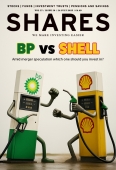Archived article
Please note that tax, investment, pension and ISA rules can change and the information and any views contained in this article may now be inaccurate.
Inflation is back – what does it mean for markets?

Inflation has returned as a live topic for markets as consumer price indices creep up on both sides of the Atlantic.
The June reading for UK inflation came in at 3.6% against the 3.4% penciled in, while the US number was 2.7% versus the 2.6% anticipated. The latter was only a smidge ahead of the forecast, so why the fuss and how did the release prompt suggestions it offered evidence of the impact of tariffs?
Berenberg’s Holger Schmieding explains: ‘The June headline CPI print alone does not reveal tariff-induced price increases, but a closer look shows clear signs. Excluding car prices and volatile food and energy costs, goods prices rose 0.55% month-on-month in June – the highest increase since November 2021.
‘At this time last year, core goods excluding vehicles subtracted 10 basis points from headline annual inflation. Now, however, they add 10 basis points – a complete reversal. This marks only the start of tariff effects.
‘Although goods make up only around 35% of the CPI (after all, the US economy is services-dominated), with effective tariff rates near 15%, with the potential to reach 25% if US President Donald Trump follows through on his recent threats, a spike in core goods inflation could push headline inflation high enough for the Fed [Federal Reserve] to avoid considering rate cuts.’
This is probably the biggest implication for markets of renewed inflationary pressures and the Federal Reserve will have to unpick whether the impact of tariffs on inflation will be sustained or a one-off, as businesses pass on the associated costs in one go.
The uncertainty around where exactly tariffs are going to land, with the US administration’s trade policy seemingly shifting on a regular basis, makes it less likely this will be a ‘one and done’ situation.
We plan to return to the topic of inflation, how it impacts on investors and ways of seeking protection from its effects in future issues. In this week’s News section we look at how prices are moving higher in the grocery sector.
A change of chair at BP (BP.) shows the company is responding to the volley of criticism which has come its way but as we explore in this article it is unlikely to be sufficient on its own to address problems which are more than a decade in the making.
Also in the digital magazine we look at how the US banks’ quarterly earnings were received and whether climate change could result in a financial crisis.
Important information:
These articles are provided by Shares magazine which is published by AJ Bell Media, a part of AJ Bell. Shares is not written by AJ Bell.
Shares is provided for your general information and use and is not a personal recommendation to invest. It is not intended to be relied upon by you in making or not making any investment decisions. The investments referred to in these articles will not be suitable for all investors. If in doubt please seek appropriate independent financial advice.
Investors acting on the information in these articles do so at their own risk and AJ Bell Media and its staff do not accept liability for losses suffered by investors as a result of their investment decisions.
 magazine
magazine








